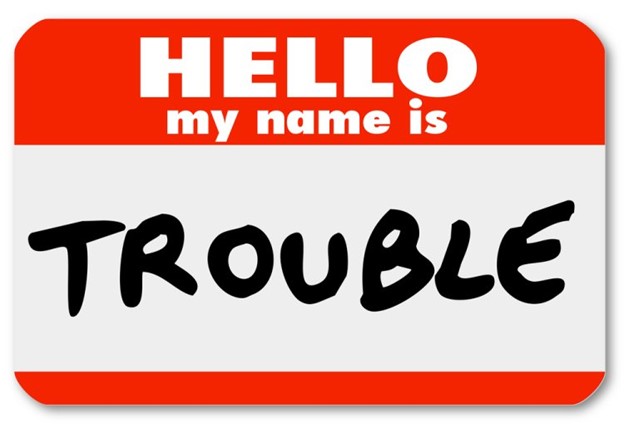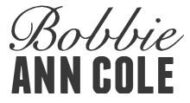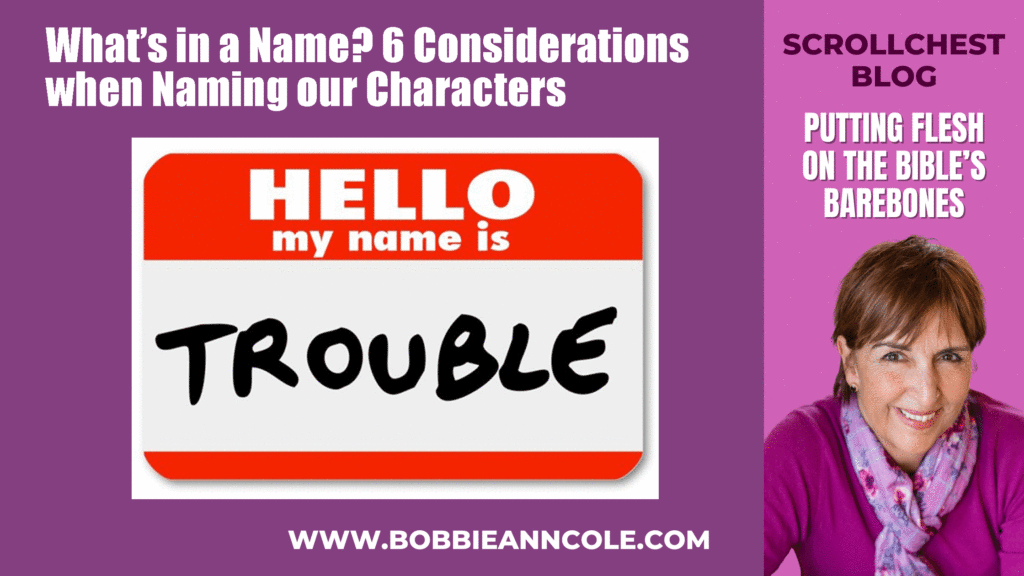What is in a name? Plenty as it turns out.
As authors, we are called to find names that suit our characters. This is true of fiction also sometimes of non-fiction. We might, for instance, name an unnamed character in the Bible if they are popping up frequently in our writing. We might suggest calling Naaman’s slave girl, for instance, by a Jewish girl’s name.
How do we choose the right name for our characters?

The Bible is very good at doing this. Adam’s name means ‘Earth’ out of which God fashioned him. It also means ‘Red’ which is the color of soil in Israel.
Naomi whose name in the Book of Ruth is ‘Sweetness’, will tell her Bethlehem friends to call her ‘Mara’ which means ‘Bitter’, for God, she maintains, has dealt bitterly with her.

Jesus’ Hebrew name Yeshua means ‘Salvation’.
I have found six important considerations when naming our characters:
- Ethnicity
- Location
- Parents
- Era
- Meaning
- Author’s Intention
Ethnicity
Your character’s name may vary according to their ethnicity. The name Joseph in Israel will be Yosef if the person is a Jew, or Youssef, if he is an Arab.
Location
Some names may be favored by specific communities within a country. In Ireland, for instance, biblical names such as Mary have been extremely popular among Catholics and Celtic names favored by strong patriots. (Mhari pronounced ‘Varry’ is the Celtic version of Mary.) Protestants who identify with Britain are more likely to follow UK naming trends.
Very common names can lead to nicknames. An Irish village with a lot of Marys might differentiate between them through nicknames. This was so in the Bible, too. I have counted nine Marys probably present at the Last Supper.
Mary’s nickname ‘Magdalene’ may have come from Magdala, a town close to Capernaum, named for its tower, (migdal). This may may have been her hometown, or she may perhaps have been tall enough to tower over other women.
Parents
Names speak volumes about parents’ aspirations and backgrounds. They can be associated with class: when Archie becomes Archibald, it takes an aristocratic gloss.
Parents may also choose a name that matches their ethnicity, faith – Christian or Mohammed – or their hopes for their children, such as Honor, Faith, Hope…
Era
Names follow fashion trends. What kind of person do the names Brad or Tracy conjure for you? Perhaps you could estimate their age, too.
Names can become popular in different places at different times. I was at school in England with Wendys, Susans and Lindas. Yet Wendys in North America tend to be a decade or two younger than me.
Some old names that once evoked the late 19th century have returned, e.g. Elsie (coming in), Lily or Annabel (in favor for more than a decade already).
Meaning
Most names have meanings that we can discover from naming books or simply googling. A few more from the Bible are:
Elimelech – My God is King
Melchizedek – My King is Righteous
Sarah – Princess
Author’s Intention
Some sounds roll off the tongue in such a way as to convey a character trait, such as strength (John, Ben…) or softness (Fleur, Janet…).

We may wish to communicate a person’s nation and age: most times, a Jean-Pierre will be French and possibly seventy plus years old, since all the Jean-Michels and Marie-France were popular choices in the 1950s.
There is a lot to think about when choosing our characters’ names. I hope I have given you some food for thought.



The power of a name in writing can never be underestimated. It is an astounding tool for hinting at the subtext, and/ or providing a prophetic element that foreshadows a key element in a plot. The Bible is masterful at this. Mary, aka Miriam, awakens our memory to the first woman prophet in scripture as a key figure in Israel’s new era of freedom; suggesting That she too is a prophet of the New Day.
I agree, Gaetane. A name influences our reader and hints at a character’s true nature/what will occur. I like your choice of Miriam as an example – since I started writing about Mary of Nazareth I have been trying to define that name – it appears to mean ‘Bitter Sea’ which is the oddest of definitions for a favored girls’ name. We have much to learn about whether or not this interpretation s correct and, if so, why it was so popular.
Yes, there is certainly a lot of meaning in a name. I have changed the names in my manuscript many times. I need to keep the names private as my story is based on a true story. At first I named my characters close to their own names, I then began to put a lot more thought into the names and I am still changing names as I go on. So this has given me a lot of food for thought! Many thanks Bobbie. Very helpful. God bless you.
I also had to change names for my coming to faith memoir SHE DOES NOT FEAR THE SNOW. Most I was able to keep but, where I didn’t have permission, I was obliged to do this. I tried to choose names that conveyed a similar idea to what their birth names were, an alternative that their parents might have chosen for them.